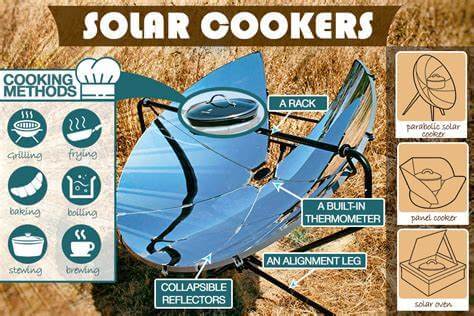Advantages and Disadvantages of Solar CookerA solar cooker is a device that pasteurizes beverages and other food products by heating, cooking, or cooking them using the energy of direct sunlight. Although some solar cookers are as powerful or expensive as conventional stoves, most are currently in use and are relatively low-tech, low-cost appliances. However, modern, large-scale solar cookers can cook for hundreds of people. To lower gasoline prices, lessen air pollution, and slow down deforestation and desertification, numerous charitable organizations are advocating their usage globally because they consume no fuel and are cost-free. The solar cooker uses solar energy in the form of solar radiation to cook meals without the use of fossil fuels. People prefer solar cookers to conventional cookers for a variety of reasons. Solar cookers are not only beneficial to the environment, but they are also simple to operate. This article's goal is to review solar cookers' benefits and drawbacks thoroughly. Before that, let's look at solar energy and cookers in general. 
In solar cookers, light from the sun is transformed into thermal energy for use in cooking. The amount of sunlight a solar cooker can capture depends directly on how much of its collector surface is perpendicular to the solar beam radiation being incident. The market is filled with a variety of solar cookers. Each design features a dazzling reflective surface that directs the sun's rays onto the cooking surface and the cooker's interior walls, which are dark. Solar cookers come in a wide variety of designs and operate slightly differently, but they all generally adhere to the same fundamental guidelines: When facing the sun, a solar cooker often has a wide surface area of reflecting material that directs the sun's heat onto a particular area of the cooker. In this location, you should set your pot or another cooking vessel. Food within the vessel will cook as a result of the focused sunshine. Solar cooking is a technique for preparing food that utilizes the sun's free energy as the fuel source. Solar cooking is growing in acceptance across the globe, and for a good reason. There are many advantages to solar cooking and very few drawbacks. Advantages of Solar CookerThere are several strong reasons to start utilizing a solar cooker, which is becoming increasingly common in many families. There are several instances where the benefits exceed the drawbacks. The first advantage is that solar cookers are distinctively green. To generate heat, traditional cooking appliances mostly use gas or electricity, both of which are environmentally harmful and polluting energy sources. These cooking methods release carbon dioxide into the atmosphere, which contributes to global warming. Using a solar cooker has many positive effects on the environment. Increasing air quality while reducing your carbon footprint can help decrease the rate of global warming. Using a solar cooker instead of an electric cooker helps to improve the quality of the air you breathe because the production of electricity from coal or gas is very air-polluting. The fact that solar energy is free is another fantastic benefit of using it for cooking. Even if you only use a solar cooker for a few meals a week, you can easily save gas or electricity costs by making the transition.
Disadvantages of Solar cookerFurthermore, an outside location with sufficient sunlight access is required to place a solar cooker. This may be challenging if you are in an apartment or a home with no yard. Once more, inclement weather might make cooking outside difficult on some days. Despite having the necessary outside area at your home, these limitations mean that solar cookers can only sometimes cook food successfully. Additionally, your solar cooker may take longer to heat up or struggle to maintain high temperatures due to rain, snow, or very cold weather. Due to these factors, solar cookers are more prevalent in warm, sunny locations, where the weather is typically more suited to these solar appliances. Because solar cookers or ovens can reach different temperatures at different rates depending on the weather on any given day, this can also mean that it may be harder to predict how long a meal will take to prepare when using a solar cooker. You would have far more accurate control over cooking times and temperatures with a conventional cooktop or electric oven. We advise using a solar cooker in addition to a regular kitchen as a secondary piece of cooking equipment because of this. Use it on special occasions when you're cooking outside, when the weather is nice, or when you're camping but still have some conventional cooking stoves to rely on when solar cookers can't be used.
The Conclusion:A solar cooker is a particular solar thermal collector that uses solar energy to prepare meals. They are undoubtedly good for the economy, health, and environment. However, the weather has a significant impact on how well they work. The three main cookers are parabolic, box, and panel solar cookers, and they can also be classified as direct or indirect solar cookers, depending on how they heat their food. A solar cooker would be a wise investment overall, but before buying one, compare each cooker's features. |
 For Videos Join Our Youtube Channel: Join Now
For Videos Join Our Youtube Channel: Join Now
Feedback
- Send your Feedback to [email protected]
Help Others, Please Share









